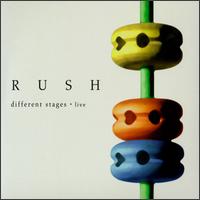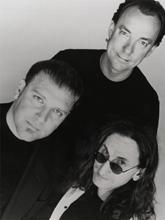
"Patterns of Force"
A 3 perspective review of RUSH- DIFFERENT STAGES
We are not here today to give any fancy descriptions of who this band RUSH is. No background histories about where they came from, no linear progression tales of how their evolution has unfolded throughout their nearly 30 year career, and no deep insight into the meaning of their lyrics will be presented here. It's all been said before, and if you don't know who this band is you are missing one of the best damn reasons to own a stereo system in the 20th century.
RUSH has always seemed to be obsessed with patterns, and the most reoccurring pattern in their career has been the very obvious number three. On the cover of 1987' s "Hold Your Fire" there were three balls, 1985's "Power Windows" saw three television sets, and on the cover of "Moving Pictures" from 1981 there were three paintings. There are, and always have been three members in the band, three members that on stage sound bigger, badder, and more talented than any band with twice it's personnel.
So with the latest RUSH album, "Different Stages" (1998 Atlantic records), the number three seems to be popping up everywhere, from a cover with three tinkertoys to the number of CDs in the package, a whopping and unprecedented three. In fact, even in RUSH's discography do we see patterns emerge, as any fan of the band can tell you. RUSH's ongoing pattern of releasing one live album for every four studio albums has come full circle once again with this latest live release, but perhaps this one is something a bit more.
"Different Stages" is the fourth live RUSH album, and it is rumored to be their final album overall, something we three reviewers hope will be proven wrong when this review, as well as it's authors, has seen a few years pass by. Past LIVE recordings from Rush have always filled a need, bringing the fans live versions of songs from the four albums preceding it. But "Different Stages" goes one, two, maybe a full three steps further. Certainly it gives us a collection of the newer songs done live, as on no other live release will we see such newer RUSH classics as "Animate", "Show Don't Tell", or "Roll the Bones". But "Different Stages" also includes a good sampling of older material, in fact the third CD is an entire set recorded unedited (as far as we can tell) in 1978 on the "Farewell to Kings" tour. Top that off with an art and sound generation CD-ROM enhancement program on disk one, and you have a RUSH package like never before.
 Sound wise, this album is an amazing achievement. RUSH has been doing what they do best for so long now that some of the live versions sound so damn close to studio perfection that it's almost frightening. "Test For Echo" for example kicks off disk two, and if not for the audience in the background one might think that the CD of the same title had been slipped in the player. But that is in no way saying that the music on this set sounds canned or hollow, as this is a live and kicking album from start to finish. Heavy favorites like "Driven" have never sounded better, and it's plain to see that some songs are a genuine joy for the band to play, as they kick and blast their way out of your speakers.
Sound wise, this album is an amazing achievement. RUSH has been doing what they do best for so long now that some of the live versions sound so damn close to studio perfection that it's almost frightening. "Test For Echo" for example kicks off disk two, and if not for the audience in the background one might think that the CD of the same title had been slipped in the player. But that is in no way saying that the music on this set sounds canned or hollow, as this is a live and kicking album from start to finish. Heavy favorites like "Driven" have never sounded better, and it's plain to see that some songs are a genuine joy for the band to play, as they kick and blast their way out of your speakers.
One of the biggest and most impressive highlights of the album include the 20 minute, sci/fi theme epic "2112", a song who's studio version spans an entire side of the 1976 album of the same name. "2112" did appear, although somewhat trimmed down, on the first LIVE Rush album, 1976's "All the world's a stage". In fact, although all 3 versions of this song are similar, there is something unique about each one. The "All the world's a stage" version has extra yelling in the beginning, and vocally it came across somewhat like Led Zeppelin. It had a much higher energy level than the other two versions. There was a sense of balls-to-the-wall, all out jamming with a recklessness that said "who gives a crap whether we hit the right note or not." Fortunately, that version hit all the right notes. The studio version had a slower pace, where each note seems more calculated and carefully played, and is considered the definitive RUSH classic my many fans.
But the version of "2112" on "Different Stages" is strikingly different from the other two. There is more artistic license and improvisation taken with it and it sounds like a much different song in some of the segments. For example, compare the segment where the boy finds the guitar and plays it awhile before approaching the priests, and you’ll find that the acoustic part there is VERY different than the other two versions. Other parts sound somewhat different as well, but easily the most striking difference is Geddy Lee's voice. It's enough to make you think that a different person is singing on this newest version, as his voice is much deeper, more refined, and signals his maturity (or old age) compared to the "All the world's a stage" version. "2112" is a perfect song to gauge the evolution of this band by. The "Different Stages" version is the most artistic, as there is less energy and the song as a whole seems more laid back, giving it a much more polished feel than the youthful rawness of the earlier versions. "2112" was a perfect addition to the album as one of the biggest complaints I hear from fans of RUSH's older music is that they no longer do these long, multi-segmented songs. Aside from "2112", RUSH also dust off some of their longer, multi-leveled tunes such as "Natural Science", "Xanadu", and "Cygnus X-1". So no matter what type of RUSH fan you are (and let me tell you, RUSH fans come in all flavors it seems), there is something here that will make your eyes light up for certain.
One minor complaint about this album (and as stated, it is a minor one) is the very low representation of songs from RUSH's 1989 album, "Presto". In fact, only one song from "Presto" appears on the album, the very same song that appeared on RUSH's double greatest hits package, "Chronicles", in 1990. A live version of say "The Pass" or maybe "Superconductor" might have made this album even more amazing than it already is.
A three CD package containing 33 songs, as well as a computer enhancement program for Windows and Macintosh both, "Different Stages" with it's special low price is an easy kill in the music store, but a hefty bounty to try and haul away and absorb all at once. Whether or not Rush decides to call it a day after this album is really hard for anyone to say but the three geniuses that never cease to amaze and delight it's fans. But if this is the last RUSH album that we will ever see, the band is certainly going out on a high note. Exit if you must gentlemen, stage left even, but remember that the door is always open should you decide to do it one more time.
Robert "Torgo" Sedler,
"Doctor Bob", and
Adrian "AB" Brevard

This page hosted by
 Get your own Free Home Page
Get your own Free Home Page
 Sound wise, this album is an amazing achievement. RUSH has been doing what they do best for so long now that some of the live versions sound so damn close to studio perfection that it's almost frightening. "Test For Echo" for example kicks off disk two, and if not for the audience in the background one might think that the CD of the same title had been slipped in the player. But that is in no way saying that the music on this set sounds canned or hollow, as this is a live and kicking album from start to finish. Heavy favorites like "Driven" have never sounded better, and it's plain to see that some songs are a genuine joy for the band to play, as they kick and blast their way out of your speakers.
Sound wise, this album is an amazing achievement. RUSH has been doing what they do best for so long now that some of the live versions sound so damn close to studio perfection that it's almost frightening. "Test For Echo" for example kicks off disk two, and if not for the audience in the background one might think that the CD of the same title had been slipped in the player. But that is in no way saying that the music on this set sounds canned or hollow, as this is a live and kicking album from start to finish. Heavy favorites like "Driven" have never sounded better, and it's plain to see that some songs are a genuine joy for the band to play, as they kick and blast their way out of your speakers. 